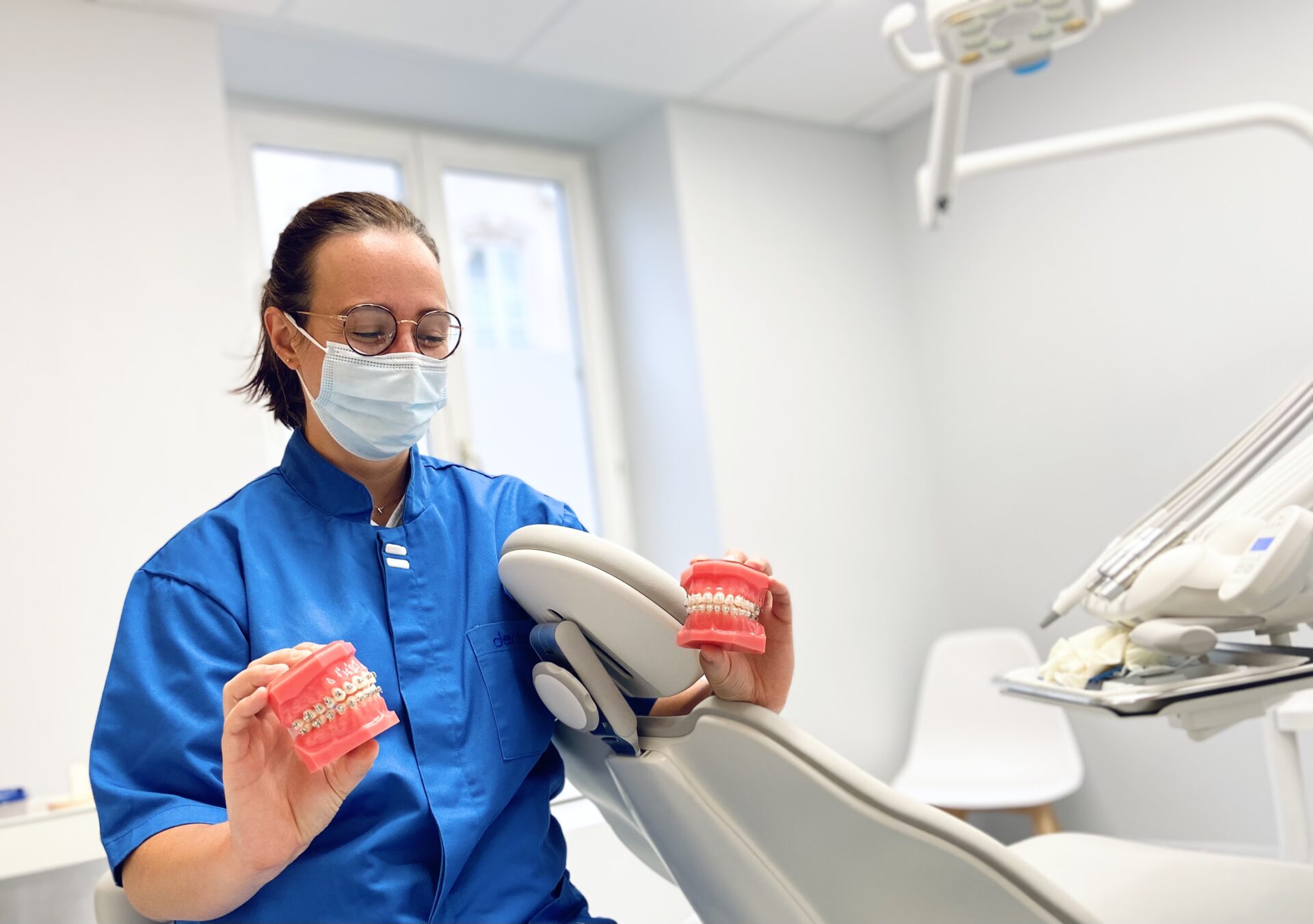
Orthodontist
What does the orthodontic dentist do? What is his role?
The orthodontic practitioner is a dental professional who specializes in the field of dentofacial orthopedics. The primary role of the orthodontist is to detect and correct dental anomalies, such as malpositioned teeth or jaws in children, adolescents and adults.
The dental surgeon practicing orthodontics carries out multiple missions on a daily basis:
- He performs consultations and clinical examinations in order to make a diagnosis;
- Implements an orthodontic treatment plan adapted to each patient;
- Selects dental appliances, prepares estimates and places orders with dental technicians;
- Selects dental devices, prepares estimates and places orders with dental technicians;
- He ensures their follow-up.
The dentist practicing orthodontics specializes in the treatment of anomalies and dysfunctions of the dentition and intervenes on both the aesthetic and functional aspects of the dentition.
What are the expected skills and traits?
Both exciting and demanding, the profession of dental surgeon with a focus on orthodontics requires a great deal of concentration and millimeter precision. Indeed, this oral health professional is required to install corrective dental devices and must therefore demonstrate good manual dexterity and great meticulousness.
After 10 years of study, the orthodontic dentist must have a good memory and a logical mind, and must perfectly master the functioning of the dento-maxillary area, in order to be able to detect anomalies and identify the treatment to be implemented in a quick and efficient way. In addition, the orthodontic dentist must regularly update his or her technical knowledge in order to propose the most appropriate solutions to his or her patients.
The dental surgeon with an orientation in orthodontics works in direct contact with his or her patients and must also have interpersonal and educational skills in order to reassure his or her patients and to teach them the right gestures to maintain their dental devices and to keep a healthy dental hygiene.
What are the advantages of being a dental surgeon with an orthodontic orientation?
Advantages
While the path to becoming an orthodontic dentist is long, there are several advantages to becoming an orthodontic dentist:
- This branch is very much in demand, as few professionals practice this discipline, mainly because of the long studies;
- Because of the lack of specialized professionals, the patient base of the dentist with an orientation in orthodontics is very simple to build up;
- This profession also offers many employment opportunities and a very good salary.
How to become an orthodontic dentist?
The path to practicing this discipline is particularly long, because it requires specialization in orthodontics. After obtaining a general baccalaureate, preferably in the scientific field, it is compulsory to follow the first common year of health studies (PACES) before entering a 6-year orthodontic program.
After completing their general dentistry studies, dental students have the option of completing a three-year internship to specialize in orthodontics and obtain a diploma of specialized studies (DES) in dentofacial orthopedics. They may also choose to complete a short one-year post-graduate program with a thesis, and then continue their studies in an orthodontic school.
Orthodontic studies and specialization in dentofacial orthopedics allow the practitioner to acquire specific technical knowledge, such as
- The student trains in 1 year in pediatric dentistry and obtains a certificate of higher education (CES) in pediatric dentistry and prevention;
- The student prepares a university diploma (DU) in clinical pediatric odontology in 2 years.
This complementary training to the studies of dentistry allows the future practitioner to acquire theoretical and technical knowledge, such as
- Anatomy and growth of the teeth and maxillae;
- Knowledge of dento-maxillary anomalies;
- Reading and interpretation of medical images (radiographs);
- Learning clinical diagnosis;
- The different types of orthodontic treatments;
- The method of placing dental appliances;
- etc.
What are the career paths for a dentist practicing orthodontics?
Since orthodontics is a specialization in the field of dental surgery, career development for the practitioner is therefore limited. However, after several years of practice, this health professional may consider opening his or her own dental practice.
It is also possible to leave a private practice to join a salaried practice in a health center, for example.
An experienced practitioner may also choose a career in the public service (hospitals, army) or turn to teaching in institutions specializing in dental care.
What is the salary for a dentist practicing orthodontics?
The salary of a dentist with an orthodontic orientation depends on several factors. For example, this health care professional can expect to earn a high monthly salary, subject to change depending on his or her place of practice, years of experience and reputation.
Who employs the dentist with an orthodontic orientation?
Like many oral health professionals, the orthodontic professional most often works in a dental office as a private professional, where he or she can control his or her own schedule.
They may also work in hospitals providing dental services, in private clinics or in dental offices with several dental professionals, with whom they share their premises and patients.
What you need to know about being an orthodontic dentist?
| SECTOR | Health |
| SCHOOL DEGREE | Bac +10 |
| FORMATION | CECSMO ORTHODONTIC MENTIO |
| SALARY | to 27 from 32% according to |
Since 2013, Dentego has been committed to the best in dental health for all.
With a network of over 80 centers throughout France, Dentego is looking for practitioners with a practice limited to orthodontics to join its teams!
Dentego is committed to offering each of its dentists with a focus on dentistry a pleasant professional environment and allows them to benefit from equipment at the cutting edge of the latest technologies. (ETK, A-Dec, Geistlich, 3Shape).
Whether you are a young orthodontic graduate or an experienced practitioner, joining Dentego means devoting yourself 100% to the care of your patients, within supportive teams where sharing experience allows everyone to evolve and progress continuously.

